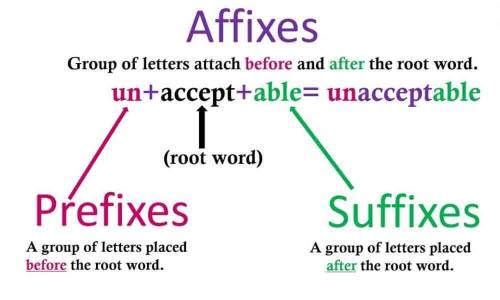Have you ever wondered why some words end with a certain suffix, while other words end with another suffix? For example, what is the difference between a word that ends with the prefix “incorrect” and a word that ends with the prefix “incomplete”?
In our daily lives, we see many words that have these two different endings. Some of them are very obvious, like ‘incorrect’ which always ends in ‘-er’ and ‘incomplete’ which always ends in ‘-ment’. However, there are also many other words that end differently. For example, the word ‘disgraceful’ has a different ending. It ends with ‘-ous’ and not with ‘-ful’.
The word ‘magnificent’ also has a different ending. It ends with ‘-ous’ and not with ‘-ous’.
Summary Table
| Prefixes | Suffixes |
| A prefix can be added before a word | Suffixes can be added to a word at the end |
| Prefixes are always used to form a new word or phrase | Suffixes can be used to add an adjective or a noun to a word |
| Some prefixes have more general meanings | Some suffixes have more specific meanings |
Definitions:

Even though we see many words that end differently every once in a while, most of the time we never think about them. But, in fact, there are a lot of words that end differently. In this article, we will discuss the differences between prefixes and suffixes.
Before we move on to the difference between prefix and suffix, let us first learn what the two are. Let’s take a look at the definitions, the similarities, and the features of these two types of elements.
What is a prefix?
A prefix is an element that comes before another one. It is placed before the element it qualifies, and it acts as a sign of distinction. For example, the prefix “ab-normal” is a prefix that has no meaning by itself. It only qualifies the adjective “abnormal” that it follows.
What is a suffix?
A suffix is a word or a group of words added to the end of a word. For example: man-made, left-handed, robot-made.
In some languages, a suffix is not necessarily a word but it can be an affix. An affix is something that can be added to the end of a word, usually adding to its meaning.
In English, the suffix -ly is an example of an affix. It means “in the manner of” or “like”. For example: quickly, prettily, gracefully.
What is a prefix?
A prefix is the part of a word that comes before another word. For example: pre-school, per-sonal, per-fect. A prefix can also be called a preposition and abugida. A prefix may also be called as prefix and postfix or superfix. In English, this part of speech is often called a preposition and prepositional phrase.
Let’s take a look at the examples: double for double blinds; pretty for pretty flowers; never for never to die; negative for negative rate; solid for solid steel; once upon a time for once upon a time in America etc..
Another example of a prefix is “premature,” which means “before its time.
” “pre-school” means “before school.
” You can see that they are all different types of words which start with ‘pre’.
What are the similarities between prefix and suffix?
Let’s see the similarities between prefix and suffix:
- Both of them are word types.
- Both of them are optional parts of speech.
- Both of them are used to change the meaning of a word.
- Both of them can be combined with each other in a compound word or phrase, as in: “pre-history” (before history) and “post-mortem” (after death).
- Both of them can be used to form a verb, as in: “pre-exist” (to exist before) and “post-date” (to date after).
- Both of them are used for adding information or description about the object or person.
- Both of them are used to add information about the verb.
- Both of them are used to add information about the time.
What are the differences between prefix and suffix?
Now that we have learnt the definition of prefix and suffix, let’s learn the differences between these two types of words.
- The position
Let’s start with the main difference between prefix and suffix. Suffixes can be added to a word at the end, but a prefix can be added before another word. This is called a prepostion.
If you add an affix to a word, it becomes an affix, but if you add a prefix to a word, it becomes a prefix. For example: after-dinner means “after dinner” or “of dinner”. If you put “pre-” before something, it makes it into a preposition or prefix which is then placed before another word in a sentence or phrase: pre-historic means “before history”.
- The usage
Suffixes are usually used in compound words, but there are also some suffixes that are used alone as words such as -less. If you look at the following examples: non-violent and -less are two examples of single words which can also be called as suffixes. In contrast, there are some other compounds that are formed with just one word such as hard-working and hard-boiled. Suffixes can be used to add an adjective or a noun to a word, but prefixes are always used to form a new word or phrase.
- The meaning
There are some suffixes that have more specific meanings such as -less. For example, a person without hair is called a hair-less.
In contrast, there are some prefixes that have more general meanings such as ‘anti-‘ and ‘co-‘. The prefix ‘co-‘ means “with” or “together”. For example: co-operative means “with co-operation”. It can also mean “together” or “jointly”. In contrast, the prefix ‘anti-‘ means “against” or “against”. For example: anti-clockwise means “against clockwise”. It can also mean the opposite of something. For example: anti-gravity means the opposite of gravity.






